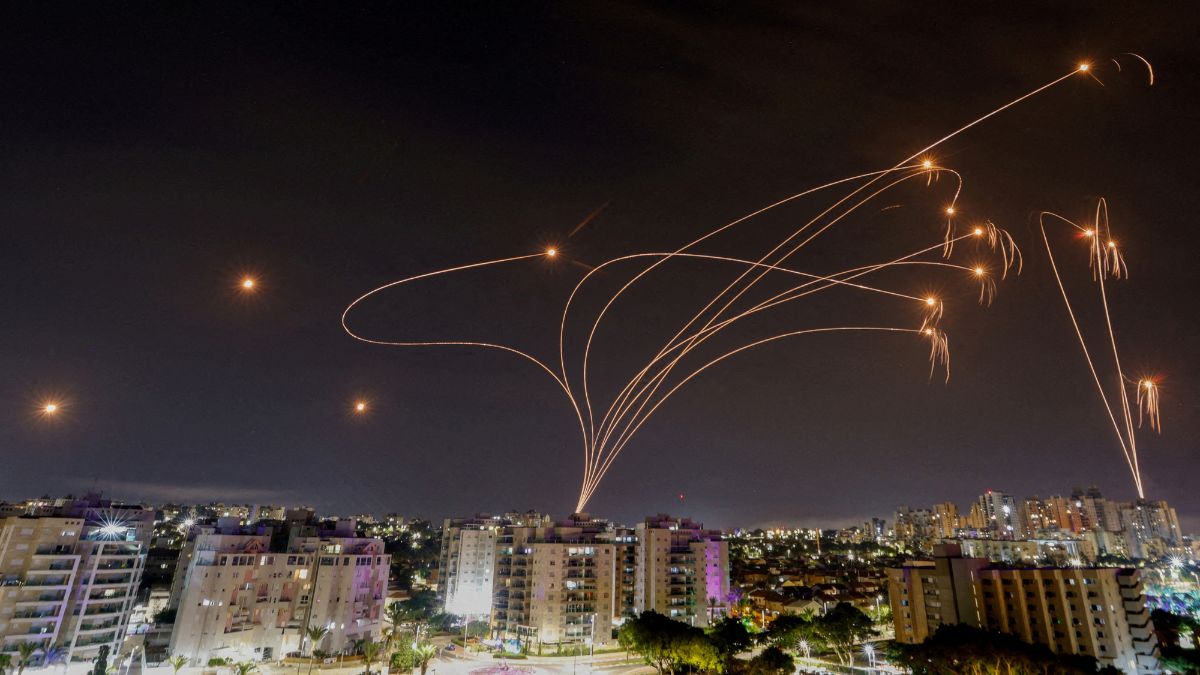Tensions continue to simmer in West Asia, three days after Iran launched an aerial assault on Israel on Saturday night. But the Jewish nation says “99 per cent” of the blitz – hundreds of drones and missiles – were intercepted. This would not have been possible without the help of Israel’s Western allies and West Asian counterparts. It is the latter that has caught the world by surprise.
The Arab nations, which have been critical of Israel’s war in Gaza, stepped in to assist in repelling the attack. From Jordan, which is home to Palestinians, to Saudi Arabia, they all played their part. We explain why this is significant.
How Arab states came to Israel’s rescue
One of the most notable aspects of the retaliation was the involvement of Jordan. It intercepted Iranian drones that violated its territory. But that is not all. An Israeli air force officer said that Jordan also allowed Israeli fighter jets into its airspace to shoot down missiles and drones launched by Iran, NBC News reports. Jordanian and Israeli fighters were coordinated by the US military , in what is thought to be the first time Israel and Jordan fought side by side, the report claims.
Residents in Amman, Jordan’s capital, indicated heavy aerial activity, with images of downed drone remnants circulating on social media.
Jordan, in its official statement, said it stopped the Iranian drones in an act of self-defence and not to help Israel. The response by King Abdullah II is seen as a balancing act by the country. Jordan has supported Palestinians and it wants to avoid getting caught in the crossfire in Israel’s war against Hamas, an ally of Iran.
The country has not remarked on allowing Israel to use its airspace.
Also Read: Iran vs Israel: Which country has the better, bigger military?
Jordan was not alone. Help came from Saudi Arabia and the United Arab Emirates (UAE). The Wall Street Journal (WSJ) reported that the two countries passed on intelligence about Iran’s plans, providing vital information that was key to thwarting the massive assault. The full role played by Saudi Arabia and “other key Arab governments” is being kept quiet, reported WSJ.
Impact Shorts
More Shorts“Gulf states, including Saudi Arabia, might have played an indirect role as well, since they host Western air defence systems, surveillance and refuelling aircraft that would have been vital for the effort,” noted British publication The Economist.
Why the role of Arab states is significant
The participation of Arab states, including Jordan, in assisting Israel garnered attention, with some commentators highlighting the potential for cooperation between Arabs and Israelis in the region.
“Iran’s attacks also rallied new international support behind Israel, including from key Arab states critical of the Gaza offensive that nonetheless supported the Israeli military response to the drone attacks,” Julien Barnes-Dacey, director of the Middle East and North Africa programme at the European Council on Foreign Relations, said.
Jordan’s involvement in aiding Israel comes amid its criticism of Israel’s military campaign in Gaza. However, Jordan shares a border with Israel and plays a crucial role in maintaining stability in the region.
Similarly, Saudi Arabia, while critical of Israel’s conduct in Gaza, has been navigating its own interests, international alliances, and realpolitik. The Saudis were poised to normalise relations with Israel before recent events, but plans were put on hold following Israel’s military campaign in Gaza.
The conflict between Iran and Gulf Arab states is rooted in religious-sectarian divisions, with Sunni-majority Gulf states facing off against Shiite-led Iran. This divide has led to a proxy war scenario, with various groups in the region receiving support from either Iran or the Gulf states.
Notably, Iran supports Shiite Muslim organisations, while certain Gulf states support Sunni groups.
Countries in central West Asia, such as Iraq, Syria, and Lebanon, with diverse populations comprising Shiite and Sunni Muslims, alongside other religious and ethnic groups, find themselves embroiled in a struggle for influence between Iran and the Gulf states.
Iran extends its influence through support for various Shiite Muslim groups, known as its “proxies,” providing financial, military, logistical, and ideological backing. These include Yemen’s Houthi rebels, Iraq’s Popular Mobilisation Forces, and Lebanon’s Hezbollah.
Hamas, though predominantly Sunni, also receives support from Iran, distinguishing itself within this framework.
Also Read: Did Jordan's Princess Salma shoot down Iranian jets headed for Israel?
Recent reports indicate that these aligned groups launched rockets from Yemen, Syria, and Iraq towards Israel, as part of Iran’s offensive.
The US military in Iraq reportedly intercepted some of these rockets, while there’s uncertainty regarding Saudi interception efforts from Yemen, although such actions have occurred in the past.
“For regional players, particularly Saudi Arabia and Jordan—who have reportedly intercepted Iranian drones—the argument will be that they are rightfully safeguarding their sovereign airspace,” Masoud Mostajabi, deputy director of the Middle East Programs at the US-based Atlantic Council, argued in an analysis published in The Atlantic Council.
“However, if tonight’s [Saturday’s] attacks escalate into a wider Israel-Iran conflict, regional actors perceived as defenders of Israel may find themselves targeted and dragged into the regional conflagration […] Given the incentives at play, it’s likely that regional leaders will be motivated to act between both parties to bring this confrontation to a close,” he added.
The recent escalation underscores the complex dynamics at play in West Asia, with regional actors seeking to safeguard their interests amid rising tensions.
The escalation of hostilities between Iran and Israel, followed by the involvement of Arab allies in assisting Israel, highlights the dynamic geopolitical landscape of West Asia. While the immediate threat may have been thwarted, the underlying tensions persist, posing challenges for regional stability.


)

)
)
)
)
)
)
)
)



